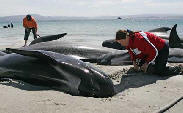EUROPEAN CETACEAN BYCATCH CAMPAIGN
"Man is but a strand in the complex web of life"
"Man is but a strand in the complex web of life"
Heartbreak and joy in the distress call of the wild
Sydney Morning Herald
4th December 2004
Andrew Darby leapt into action when dozens of whales stranded themselves on a small Tasmanian beach this week.
To touch, the black skin is as smooth as the palm of a hand and as hard as a weight lifter's bicep. The eye is small and dark. It regards me through salivary tears. The body is like a boulder. To put my weight against it and heave is like trying to push a car sideways. Then the whale breathes out. Phew. Old fish.
There are about 40 pilot whales on Darlington beach, a quiet, sun-
Some clearly won't swim again, but many blow and gasp. One breaks into a mad tail flap; others swim in towards the stranded pod. A little further offshore about 30 dolphins school tightly; on the beach, people gather like chance arrivals at a big road smash.
Andrew Irvine, 35, a former keeper of seals at Taronga Zoo, pulls on a wetsuit. Now a marine conservation officer with the Tasmanian Government's Nature Conservation Branch, it is his first live mass stranding. "I've done single strandings, and others where they were all dead.” This time there is still the chance of a success.
A handful of other people appear: a teacher from a school group visiting the island national park; a couple of fishermen, a policeman. We try the big one. "Don't pull on the fins," Irvine says. "They're not handles.” We strain again. Nothing doing.
So we leave Fish Breath, and wade across to a smaller cow-
It whistles at high pitch unceasingly though, like a child crying. "Bring it back to the mother," Irvine says. As we do, she breaks free in a flurry and both head offshore. Police in an inflatable boat shepherd them away from the beach. More people appear, are signed in and hurry to help. A Sydney tourist, Evon Jenkinson, was wearing a happy shirt picturing playful dolphins when she came to tour the island. She was distressed by slow initial progress. "Give me something to do," she says. "Please! Anything!"
The rescue managers improvise. Fire hose pumps are carried to the beach and set up to spray seawater on drying skins. Jenkinson and others spread heavy hessian mats over the bodies, and wet them down. Heat stress is a killer for whales on a beach.
Gradually Irvine develops a lifting team: Green Corps workers, dreadlocked school leavers, and big middle-
The first task is to right the animal. Top-
So we go back to old Fish Breath.
He's further out of the water now, and we can see what an impressive animal he is. Perhaps 1.5 tonnes of bull pilot whale. His black skin has parallel scars from other teeth, and a patch of white mottling behind the dorsal fin. He is built to be a diver -
We scrabble around him, trying to drag sand away with hands and spades to deepen a channel. When someone brings a spade down near his melon-
Under Irvine's direction we roll him slowly from side to side, and a mat is eased under his middle. We have three mats, perhaps 15 people. All we need to do is move him an inch. If we can do an inch, we can do another inch.
On a count of three, we strain. We lift him. It's happening. The teamwork is strong. We keep lifting, turn him around, head back into the water. The deeper we go, of course, the easier it is.
When we leave Fish Breath, Irvine asks one person to stay and help keep him stable. A woman who has stood beside him for an hour says: "I'll stay, he's ... " I finish her sentence for her: "Mine?” We both laugh.
I left the rescue soon after. Many like Irvine kept going for more than eight exhausting hours. A total of 24 pilot whales were carried off the beach and saved. Perhaps six in the wash were helped; another 19 died.
As strandings go, it was a very good result. "Without volunteers it wouldn't have happened," Irvine says. "It is a numbers game for sure."
Top
Blow by blow ... it's slow but rewarding rescuing whales on the beach at Maria Island.

Click on image to enlarge
Photo: Peter Mathew